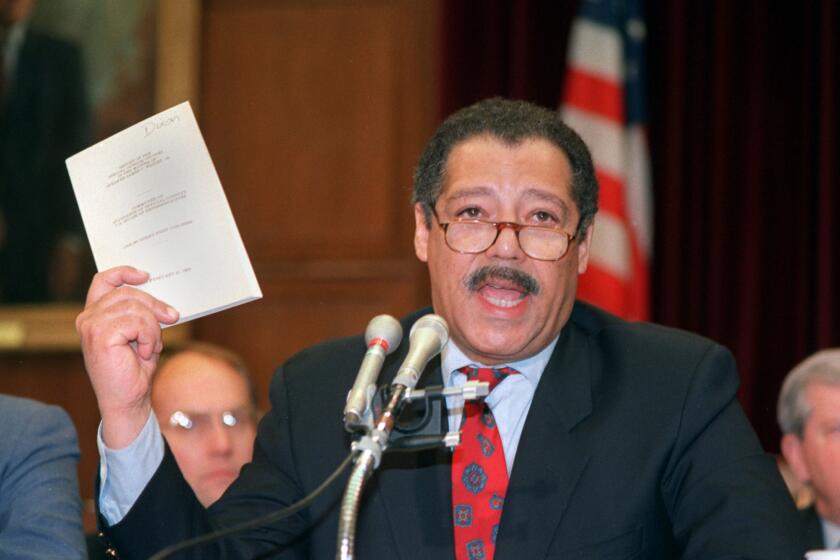Feinstein’s absence puts focus on Newsom’s promise to appoint a Black woman as senator
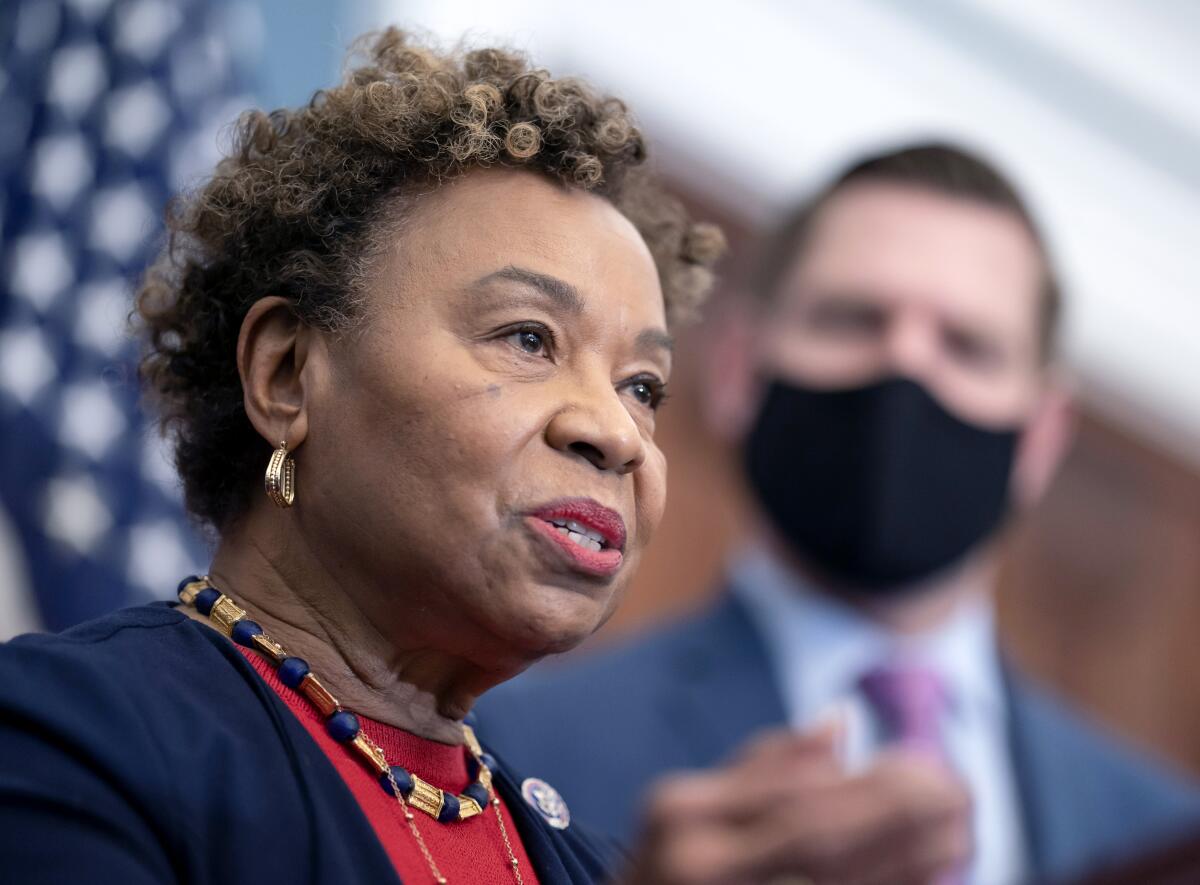
Sen. Dianne Feinstein’s weeks-long absence from Washington as she recuperates from shingles not only led to calls for her retirement, it refocused attention on Gov. Gavin Newsom’s promise to appoint a Black woman if either of California’s U.S. Senate seats opened up.
While Feinstein on Wednesday vowed to return to the Capitol before retiring at the end of her term in early 2025, Black leaders in California wonder if the governor’s sincerity remains. Stirring those doubts: Newsom has been silent about whom he supports in the state’s 2024 Senate race to succeed Feinstein, even though the field includes just one formidable Black woman candidate: Democratic Rep. Barbara Lee of Oakland.
“Making good on a commitment is a serious thing to the most critical base of Democratic Party voters,” said Aimee Allison, founder and president of She the People, an advocacy group pushing for more women of color to hold elected office. “The governor could complicate his legacy and push Black women, who in this state are a significant and critical voting bloc, to view him skeptically as someone who’s unwilling to support us when it counts.”
The 100-member Senate does not include a single Black woman, a void left when Kamala Harris, President Biden’s 2020 running mate, was sworn in as vice president and vacated her California seat.
Despite pressure on Newsom to appoint a Black woman to take Harris’ seat, the Democratic governor instead tapped then-Secretary of State Alex Padilla, a longtime political ally who made history as California’s first Latino senator. To stave off criticism, Newsom pledged to appoint a Black woman if another Senate seat became vacant, not a far-fetched possibility given reports that Feinstein, now 89, suffered from declining cognitive abilities.
With Feinstein’s retirement plans already cemented, some Black elected leaders and political activists are questioning why Newsom hasn’t already endorsed Lee. The House progressive is running against two Democratic colleagues, Reps. Katie Porter of Irvine and Adam B. Schiff of Burbank, who have raised more money than Lee and are performing better in the polls.
“We still do not have a Black female senator in those halls. [Newsom] could be part of history. Right?” said Rep. Sydney Kamlager (D-Los Angeles), who has endorsed Lee along with Schiff in the primary. “It’s very curious.”
If Feinstein were to resign before November 2024, Newsom has the authority to appoint someone to fill the seat until 2025. With Democrats’ control of the Senate resting on a slim majority, Newsom would be under intense pressure to immediately name a successor.
If Sen. Dianne Feinstein retires, Gov. Gavin Newsom said Monday he would nominate a Black woman to fill the seat.
In that scenario, whomever Newsom appoints would have an immediate advantage over the other candidates, given the heightened public profile and fundraising abilities of Senate incumbents. Padilla, after his appointment by Newsom, cleared the Democratic field last year when running for his first full term and breezed to victory over a Republican rival.
As with the Los Angeles mayor’s race last year, Newsom appears for now content to stay on the sidelines as Lee, Schiff and Porter compete.
“There are three extremely qualified candidates in the race that have displayed the courage it takes to fight for California values in Washington, D.C.,” said Lindsey Cobia, Newsom’s senior political aide. “At this time, the governor will not be weighing in on the race.”
A Lee campaign spokeswoman declined to comment on Newsom’s decision but said that the congresswoman’s “primary concern is for Sen. Feinstein’s health. She is wishing the senator a full and speedy recovery.”
In 2020, Kamlager, then a state senator, and a multitude of other Black elected leaders sent a letter to Newsom urging him to appoint either Lee or then-U.S. Rep. Karen Bass, now Los Angeles’ mayor, to replace Harris. Harris was only the second Black woman ever elected to the U.S. Senate, after Sen. Carol Mosley Braun (D-Ill).
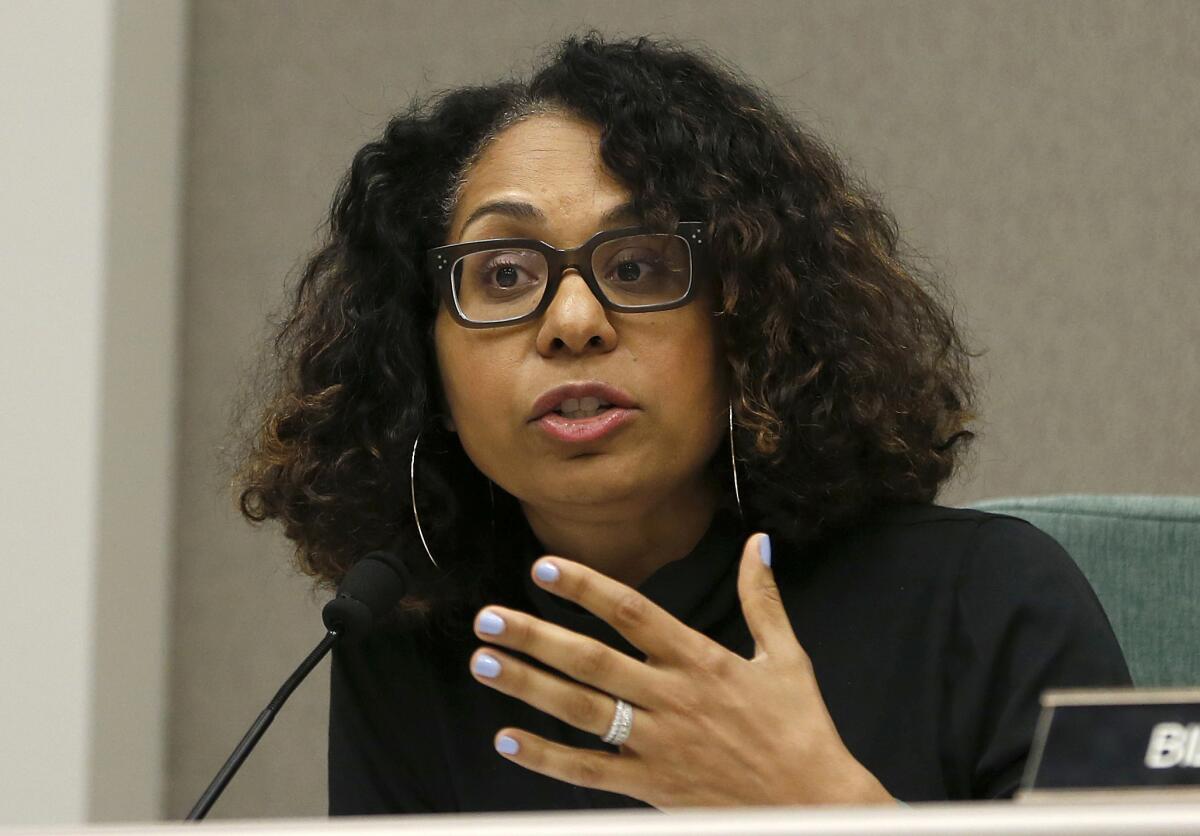
Since Reconstruction, just six Black people have been elected to the Senate.
Despite Newsom’s decision to appoint Padilla instead, both Lee and Bass threw their political organizing heft behind the governor as he successfully fended off a 2021 recall attempt.
Newsom did not do likewise when Bass launched her campaign for mayor and faced off against Democratic businessman Rick Caruso, a former Republican. The governor said he didn’t want to wade into Democrat-on-Democrat contests. Some of Newsom’s top political advisors were working for Caruso.
“I have deep respect for both of them, and I have not gotten involved in that race,” Newsom said in a television interview.
There has been a deep absence in Congress: The last Black man to represent California was Rep. Julian Carey Dixon, who died in 2000.
The governor’s choice in the Senate contest has a similar dynamic. Newsom’s political team is spread out across the campaigns of the three top Democratic candidates and the independent expenditure committees set up to support them.
“For the second cycle in a row, he’s ignoring the viable progressive Black woman. So it’s a little strange,” said Ludovic Blain, executive director of the California Donor Table. “When he didn’t do the Karen Bass endorsement, that made me wonder about the pledge.”
For her part, Bass, who endorsed Lee in March, had little to say about Newsom’s dilemma, telling The Times in a recent interview that “one of the things that I hate as an elected official is choosing between your friends.” Still, the opportunity to make history cannot be ignored, she said.
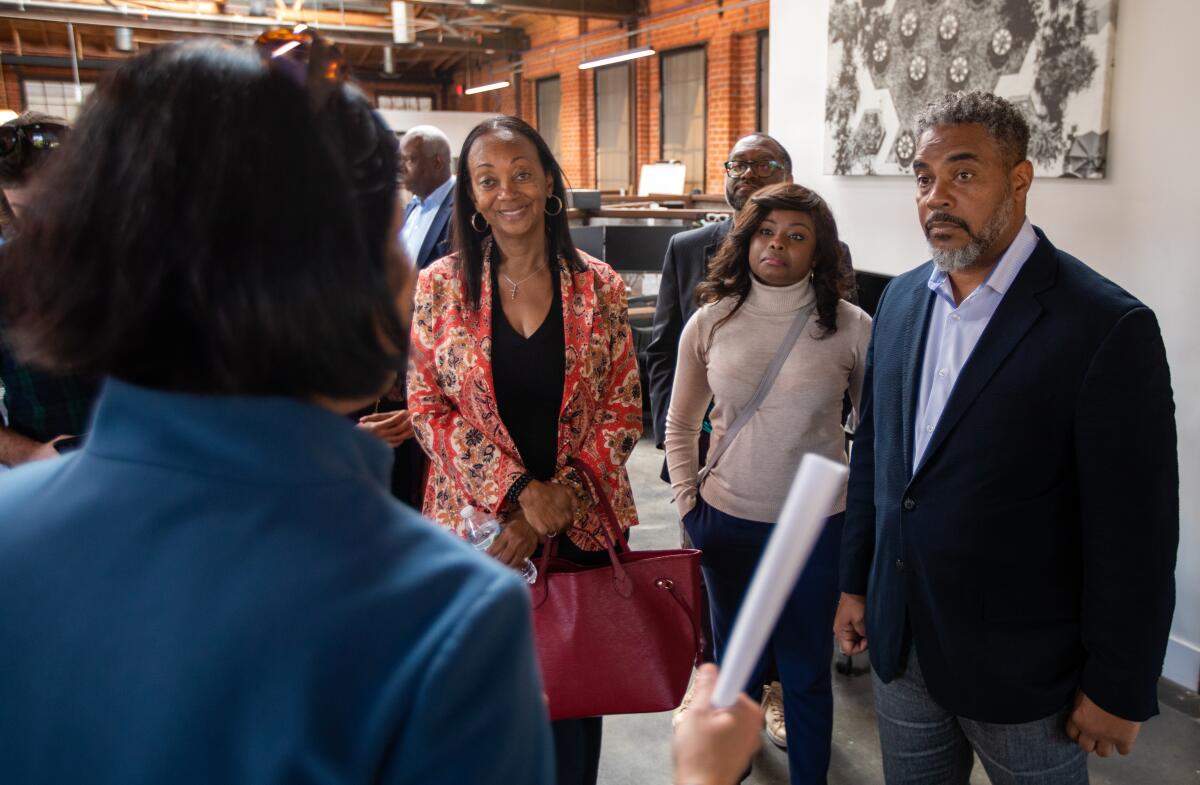
“The fact that there are no African American women in the Senate is significant,” she said at a recent reception for members of the Congressional Black Caucus who were visiting Los Angeles.
The caucus’ political arm has endorsed Lee, and its chair, Rep. Steven Horsford (D-Nev.), had recently been in Oakland to support her Senate campaign.
He said Lee “is the most qualified person to be in the United States Senate at this time,” but acknowledged the current political realities in the race to succeed Feinstein.
“No one expected, necessarily, for the seat to be open, but because it is, everyone has the opportunity to run,” Horsford said.
L.A. County Supervisor Holly Mitchell in 2021 also urged Newsom to appoint a Black woman to replace Harris. But now Mitchell says an open primary is not comparable to a moment when an appointment was on the table. Mitchell says she plans to make an endorsement in the primary but has yet to do so.
“It was huge that [Newsom] made the commitment in terms of appointment, and that has not come to pass,” she said. “As I said to Ms. Lee when we spoke on the phone, I am deeply proud that she has chosen to enter the race. Whatever the outcome of California’s decision, there are Black women in the wings, who are making moves, who will get to the U.S. Senate.”
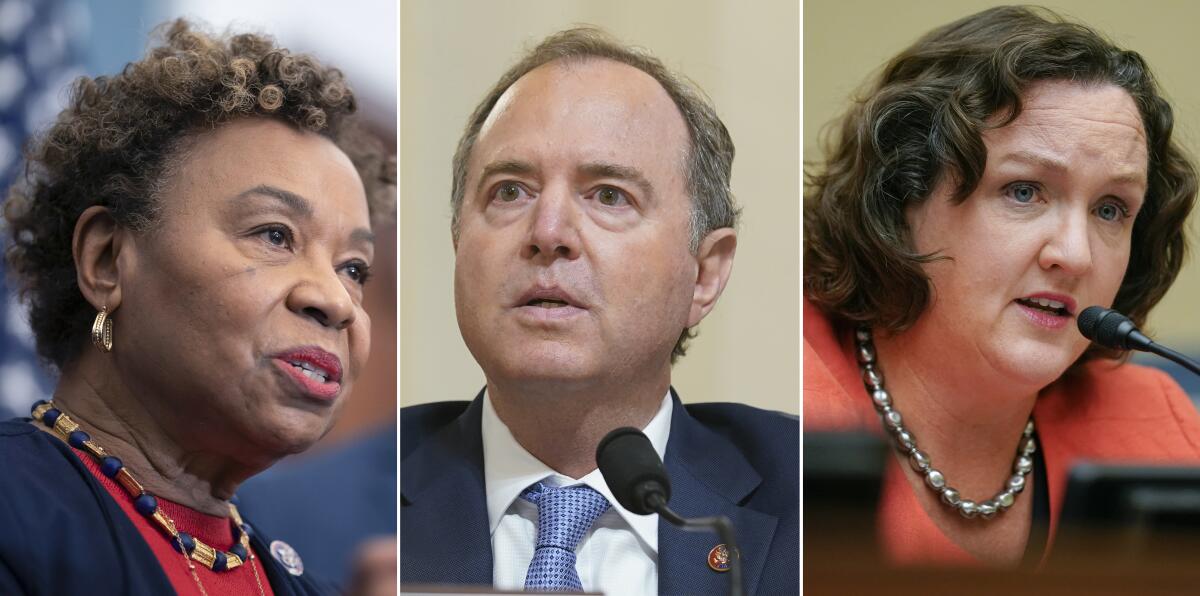
)
In fundraising totals released by the candidates for the first quarter of 2023, Schiff took in $6.5 million, Porter $4.5 million and Lee $1.4 million.
Newsom’s national prominence and fundraising prowess could be a boon for Lee, who lacks the fundraising firepower and familiarity to voters of her Democratic rivals. A poll by the UC Berkeley Institute of Governmental Studies in February found that Schiff has the support of 22% of registered voters, with 20% backing Porter and 6% supporting Lee. The remainder chose other candidates or were undecided.
At the time of the poll, no well-known Republican had entered the race. Attorney Eric Early, who twice ran unsuccessfully for California attorney general, entered the race earlier this week.
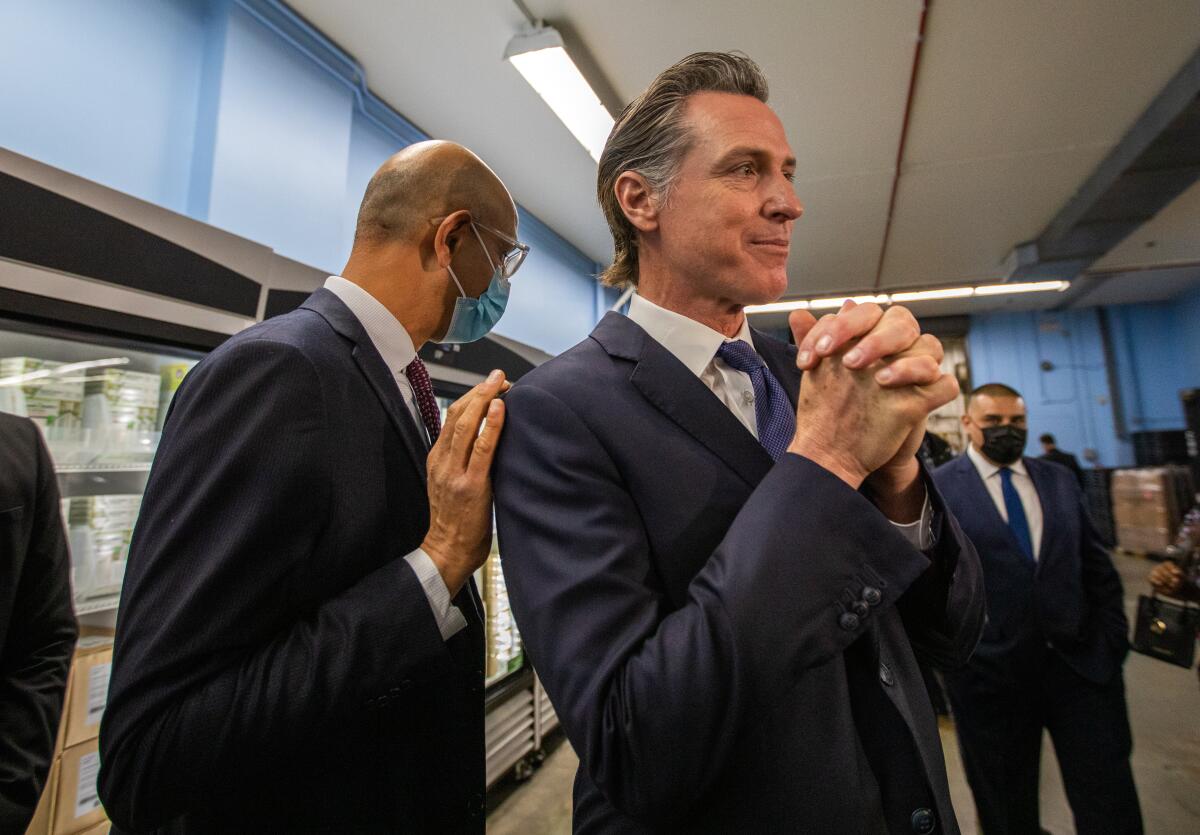
Allison, of She the People, said she would love to see Newsom use his political influence behind the scenes to drive donors to Lee and noted the importance of Black female voters, who vote reliably Democratic and have swayed tight races throughout the country.
Newsom’s approval ratings, in particular, are often highest among Black registered voters. In a Berkeley IGS poll conducted in February, 71% approved of the way he’s handling his job.
Allison compared Newsom’s pledge to President Biden’s commitment to name a Black woman to the U.S. Supreme Court during the 2020 presidential primary. He followed through with the nomination of Justice Ketanji Brown Jackson two years later.
“We’re not going to be satisfied with lip service or lesser than,” Allison said. “We want representation in the Senate.”
Times staff writers Taryn Luna and Seema Mehta contributed to this report.
More to Read
Get the L.A. Times Politics newsletter
Deeply reported insights into legislation, politics and policy from Sacramento, Washington and beyond. In your inbox three times per week.
You may occasionally receive promotional content from the Los Angeles Times.

